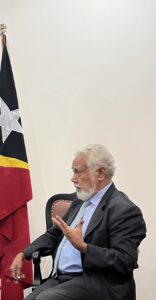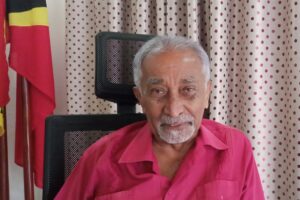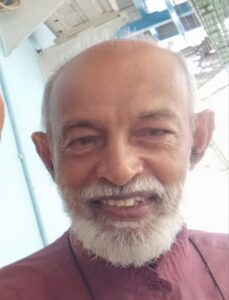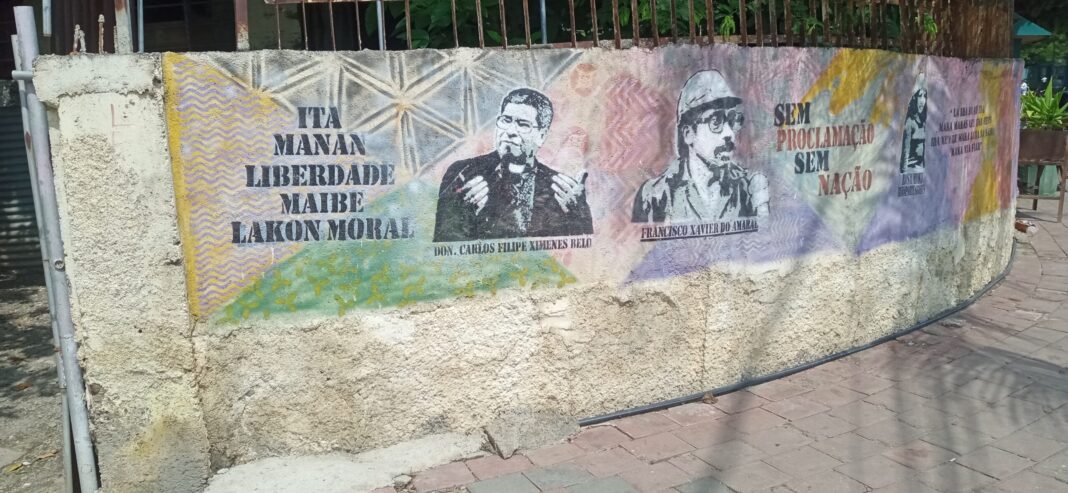by Emanuele Giordana from Dili (East Timor)
“We are a small country, but in 2025 we will join ASEAN (The Association of Southeast Asian Nations). We may have little to give, but I believe in the importance of being in an active regional context”. Xanana Gusmao, the “Che Guevara of Asia”, receives us in a small room in the East Timorese government building, a milky white structure overlooking Dili’s waterfront. He carries the weight of the years well, this 78-year-old gentleman who has always had his elegance, even when he was in camouflage, an unkempt beard, an empathetic smile that he has retained even though he now wears a blue suit and a perfectly knotted tie. Gusmao was not only one of the protagonists of the liberation of East Timor, along with Ramos Horta, Mari Alkatiri and Bishop Ximenes Belo. He was also the man of the moderate turn when he left the Fretilin Liberation Front to found his party. It was this party that made him prime minister in the last elections. He has been a fighter, a mediator, a president and a prime minister. A protagonist in the struggle against Indonesia, the occupying country, but also in the internal struggle against the revolutionaries who accuse him of having changed sides.

Pragmatic as ever, he now has to get his country into the Southeast Asian Regional Association, a leap that will make East Timor the 11th member. A difficult path. Before being invited to the ASEAN summit in Jakarta last September, he dropped a bombshell for which many have not forgiven him: “In ASEAN, we will not join until the Myanmar dossier is resolved,” Xanana said in August 2023. That was eight months ago. And now? “It was a statement made at a time when I was very upset about the expulsion of our diplomats from Myanmar. I was afraid of the consequences, but then, in my conversations with other governments, not only with ASEAN countries but also with China, Japan and the United States, I sensed the same desire for change: to return democracy to the Burmese people”. A little-known war, hidden by others in the spotlight. But, he says, without the words needed to extinguish it: What strikes me about the conflicts in Gaza or Ukraine is the silence. And the inability of those who might have the leadership to engage in dialogue. And then there is this sense of powerlessness because we are small, even though we know what the suffering of war is. When we speak, who listens? Those who could make their voices heard choose instead to remain silent and sell weapons. We need a change of attitude and we also need a reform of the United Nations.
It is a subject close to his heart and one he has spoken about before. At the 69th UN General Assembly (2014), for example, he recalled that the Western democracies “that say they are shocked by human rights violations in developing countries” are the same ones “that have sold sophisticated weapons to Indonesia”. A country with which East Timor has closed accounts and which is now Dili’s main sponsor for joining ASEAN. As we say goodbye, I want to joke: “We used to call you the ‘Che’ of Asia. What remains of this myth for you?”
“With Fretilin we made the mistake of being closed, a Marxist Leninist Maoist party, so if you weren’t with us you were out. We even killed each other. Then in the 1980s we realised we had to open up: are you for independence? Then we are together. Before that, anyone who was not Fretilin was simply an enemy”.

The country today has no enemies, but it has its difficulties. It is small, it has less than a million and a half inhabitants, it has widespread education, but it lacks standard education. It has black gold, but it is running out, and critics, looking at a state budget of which 70% comes from the gas-oil sector, accuse Timor of a policy of subsidies – more than 40% of the budget – that does not encourage entrepreneurship. Then there is the protracted political crisis in Fretilin, of which Ramos Horta was one of the founders. Along with Mari Alkatiri. Alkatiri is a man of few words. Seemingly cold. He received us in his office as a former prime minister. He is the man of the beginnings, Prime Minister of the first government after the 2022 referendum, the man who negotiated with the Australians to defend Timor’s oil and who made Oecussi – the exclave in Indonesian territory – a small paradise, as many acknowledge. Then, after the dark events of 2006 – revolt and violence that prompted an international coalition to intervene – he lost the premiership. Fretilin, of which he is secretary, then suffered a haemorrhage of votes.
What does he accuse Xanana of? “Incompetence, an incomprehensible budget, the relationship with a ‘constructive’ opposition – which Fretilin offered him – and which for the government means always saying yes, pressure on the judiciary… Xanana is not a manager. He remains a commander. This is based on a coalition that only thinks of party interests”. Is dialogue impossible? “I would like to say that it is, but I cannot. They think emotionally, not rationally, and they have no idea of the country. I believe in a government that knows how to listen, and that is inclusive. This one is not. They all agree on one point: to join ASEAN, an arena “where we have to be heard.”

For a reporter brought up on the myth of the Timorese revolution, now called liberation, it is difficult to take stock. But this small country has managed to move from armed struggle to a peaceful transition. It has managed to put the past behind it. The Indonesians, who invaded the island in 1975 with violence and massacres, are now friends. President Horta has just congratulated Prabowo Subianto, the new Indonesian leader who commanded the invaders’ Green Berets in the 1980s. That generation – the Xanana, the Alkatiri – created a model that he then transferred to the G7plus, a 20-nation intergovernmental organisation based in Dili that serves as a platform for conflict-affected countries to overcome war through national dialogue. Is it unrealistic? Perhaps, but it is an expression of a rather unique heritage that continues to show that there is another way than war. As for the older generation, perhaps it should give way to leaders who are not there at the moment. Even for those ponderous and contentious presences?

The fact that Gusmao and Alkatiri do not get on is nothing new. We ask Roque Rodrigues, a Timorese of the same generation – who still calls himself a “fighter” and has held important official positions – whether there is also a clash of personalities. “It could be,” he says, spreading his arms wide, “because they are two very charismatic personalities. If they have a weakness, it is that they cannot talk to each other. Also because they are surrounded by people who fan the flames: for some, Xanana is a devil. For others, Mari is linked to Al-Qaeda… because – he laughs, – Alkatiri is of Yemeni origin”. But he also has something to say about his generation: “We elders were important. But now, for a young man from Timor, some words no longer have the same meaning as they did for us. For us, the name Prabowo Subianto means something. They see us only as what Tik Tok offers them”.
On the cover photo, revolutionary murals in Dili. In the text: Xanana Gusmano (photo by V. Caretti), Mari Alkatiri, the remains of a fighter in the capital’s Resistance Museum, Roque Rodrigues
This article was also published in Italian on il manifesto and Lettera22
























